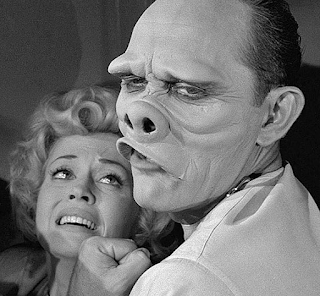Compose a message through some else’s eyes
 |
| Twilight Zone: The Eye of the Beholder |
Although I don't think it's needed at this point I will mention there are spoilers about this particular episode.
The story outlines the tragic plight of a woman who has been horrible disfigured and all other attempts to make her look "normal" have failed until this final last ditch attempt. Through out you don't see the woman or the faces of the other characters. That is until the end when they unveil the woman by removing the bandages and you see, what at the time of filming, would have been considered an attractive movie star and as the camera pans around you also realize that everyone else appears to be "disfigured" according to what the vast majority of humans look like. Now your mind is blown and you spend the rest of the day really thinking about what you consider "normal". Mission accomplished.
Clearly this is a story that attempts to drive home the point that, as the old adage goes "beauty is in the eye of the beholder". Well the principle can hold true for our communication. The meaning of our words, written, spoken, etc. are in the minds of the recipient.
While I agree that what constitutes a normal appearance is very subjective and is driven by cultural biases and trends of the time I would propose that communication can fall into this same arena, but in a sort of microcosm of time. Most of us have probably experienced a situation where you've sent a text, e-mail or social media post and the results where widely varied. After getting this feedback and re-reading the message through the lens of those other readers you can clearly see why they interpreted your words as they did.
This does not always mean that something horrible was conveyed or that you horrible offended a portion of the population, it could simply be that there was a misalignment, but still wouldn't it be great to find ways to avoid it in the first place. Perhaps these next communication tips could help you as they have helped me.
Know your audience and write to them, not to yourself. When you draft communication or are speaking to a group consider the audience and avoid the trap of assuming they know what you know. This doesn't mean you have to spell out every little detail and link to a thousand different references, but be aware that terms often have context and you should try to explain the context when possible as this can avoid a great deal of misalignment.
Tone of voice DOES NOT travel across written word without a HINT. This is easily illustrated in the form of j/k. When you write a text message to someone that is clearly meant to be sarcastic tacking a little j/k at the end avoids the possibility of the other person taking your words literally. It is wise to do this in all formal settings, such as speaking to a larger group beyond your immediate colleges or friends that probably better understand your sense of humor.
When you have the benefit of having some time to draft a response consider re-reading a message after some time passes from initially writing it. Not only will you catch obvious typos you may find that portions of the message carry a tone you didn't intend. Maybe you were hungry when you were writing and rushed through something or you had a bad morning due to something completely unrelated. Take a break and return to re-read with a "fresh" pair of eyes.
I hope this will benefit you as much as it has benefited me. As I've found effective communication and the conveying of ideas in a way that aligns two unique personalities is like having a super power and I'm sure if harnessed correctly it can be used to conquer the world.

